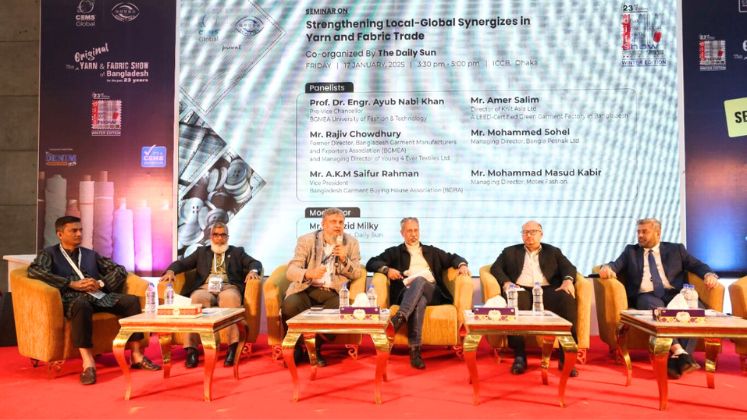
Entrepreneurs in the readymade garments (RMG) sector have urged the interim government to establish a ‘Reforms Commission’ aimed at fostering sustainable development within the industry. This appeal was made during a seminar titled Strengthening Local-Global Synergies in Yarn and Fabric Trade, co-hosted by CEMS-Global USA and CCPIT-Tex China, which coincided with the 23rd Dhaka International Yarn and Fabric Show 2025 at the International Convention City Bashundhara (ICCB) in Dhaka.
Mohammad Masud Kabir, Managing Director of Motex Fashion, highlighted the critical role of the garment industry, which accounts for over 84 per cent of the country’s total exports and has generated more than 4 million jobs. He noted that the sector has faced significant challenges, yet the interim government has not yet formed a dedicated commission to address these issues. He pointed out that the number of operational factories has plummeted from around 6,000 two decades ago to about 3,000 today, despite the emergence of approximately 1,000 new entrepreneurs during that period.
Kabir raised concerns about unresolved issues related to gas and electricity supply, customs operations, port functionality, tax administration, banking, corruption, and transportation. He questioned why, despite the government having initiated six reform commissions in other areas, the RMG sector has not received similar attention.
Prof. Dr. Engr Ayub Nabi Khan, Pro Vice Chancellor of BGMEA University of Fashion and Technology, echoed Kabir’s call for a reforms commission, stating that while the industry has overcome numerous challenges since its inception in the 1980s, innovative strategies are urgently needed to achieve the government’s goal of increasing exports from less than US $ 50 billion to US $ 100 billion by 2030.
Dr. Ayub emphasised the importance of focusing on man-made fiber products, as there is a growing preference among global buyers for such items. He advocated for collaboration among the government, private sector, and academic institutions to drive sustainable development in the industry and suggested that embracing the Fourth Industrial Revolution (4IR) could unlock significant opportunities.
AKM Saifur Rahman, Vice President of the Bangladesh Garment Buying House Association (BGBA), stressed the need for improvements in research and development, marketing, and negotiation skills to secure fair prices for Bangladeshi garment products. He acknowledged the ongoing growth of the RMG sector despite various challenges, including labor unrest, but highlighted the necessity of focusing on R&D and sustainability.
Amer Salim, Director of Knit Asia Ltd, a LEED-certified green garment factory, pointed out Bangladesh’s third-place ranking globally for green factory construction, with 233 such factories in the country. He emphasised the importance of maintaining this status to ensure sustainable industry growth.
Mohammed Sohel, Managing Director of Bangla Poshak Ltd, called for enhanced government and banking support for small and medium-sized enterprises (SMEs), which play a crucial role in the economy. He noted that many well-known garment factories began as SMEs and highlighted the need for proper regulations to ensure compliance and support for these businesses to thrive.






